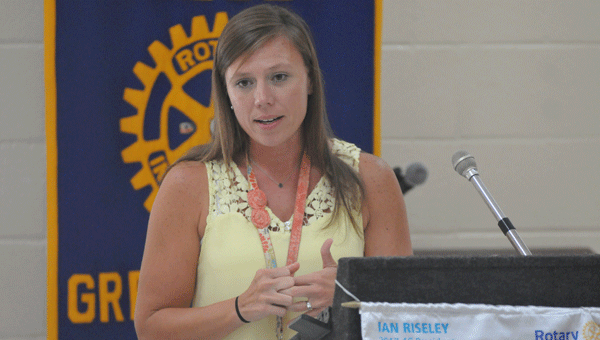DHR seeking foster parents for area youth
Published 6:47 pm Friday, August 18, 2017

- Alicia Sexton, representative with the Butler County Department of Human Resources, spoke at the Greenville Rotary Club’s weekly meeting Thursday about the dire situation the department is facing regarding the county’s foster children.
Butler County’s Department of Human Resources are in search of some human resources of their own.
There is a dire need for foster families in Butler County according to Alicia Sexton, supervisor of child welfare and adult services at Butler County DHR.
Sexton spoke at Thursday’s Rotary meeting about the challenges facing the department.
According to Sexton, there were 17 reports made in the month of May—11 child abuse and neglect reports and six prevention reports, in which there is not enough information to say that a child is in immediate danger.
There were 10 child abuse and neglect reports in June and two prevention reports, and five child abuse and neglect reports in July with two prevention reports.
She added that statistics are lower in the summer months because children are seen less often, and that the numbers spike once school is back in session.
“I did ask to come today because I’m recruiting for foster parents,” Sexton said. “And I know that’s not a job that everybody can do or wants to do, but we are in desperate need. In the state of Alabama, there are over 5,000 foster kids. In Butler County, there are 20 foster children, but I have five foster homes. And that’s it, out of all of our county.
“I have only six children placed in my county. I have 14 children in other places in Alabama. I have them as far north as Courtland, which is up above Moulton, and I have them as far south as Mobile. What that means in children are not in close proximity to their families. They’re not able to visit their siblings as they should. That also means my workers are on the road once a month to visit these children, because it is a requirement that the worker has to see a child in their home or facility at least once every 30 days.”
Coincidentally, the Butler County DHR is offering foster/adoptive parent training classes beginning Thursday, Sept. 7.
The classes will begin at 6 p.m. at DHR’s new location, 182 West Adams Street in Greenville, and the courses would teach prospective foster and adoptive parents many things that those who are already parents may know—as well as a few unique challenges that come with providing care for foster children.
“It’ll teach you how to react to a child that has been abused or neglected, or how to handle a child who may hoard food, because he hasn’t been fed at home,” Sexton said.
“He comes to your house and you have an abundance of food in your refrigerator—well, he may hoard that in his bedroom.”
The course consists of 10 meetings for three hours a week. Both prospective foster/adoptive parents must participate.
Married couples must be married for more than a year. Those who are divorced must present a divorce decree. Cohabitating couples can’t be licensed if they are unmarried.
Couples are checked for first-aid and CPR certification—which DHR offers at no cost— car insurance, pet vaccines and lifeguard certification, if couples own a pool.
Sexton said though raising a child can often prove expensive, the act of becoming a foster parent doesn’t cost anything. DHR also provides board payments for foster parents to support the foster children under their care.
Sexton said that the ultimate goal of DHR was to reunite children with their families. When foster parents receive children, there is a 12-month window in which DHR attempts to provide the family member from whom the child was taken with services to allow for the reintroduction of the child into the home.
“If momma hasn’t gotten it together in 12 months, at the end of 15 months we file for their termination of rights,” Sexton said. “What that means is you’re severing all ties from that child to that family, and that child is placed up for adoption.
“We don’t like to do that—that’s not our goal. Our goal at DHR is to keep families together, and if you can’t keep them with momma and daddy, maybe with grandmother, or maybe the neighbor who helped raise them when momma worked all the time. If the family friend is all you’ve got, you work with the family friend. But sometimes, in some cases, there isn’t even a family friend to work with.”
For more information about DHR’s foster/adoptive parent training classes, contact Lisa Butts at 382-4400, or 382-4416.





